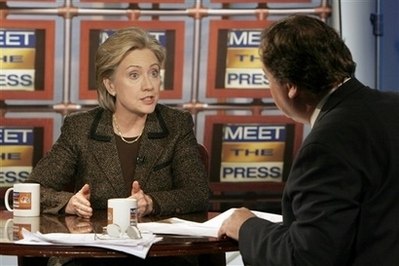Clinton, Obama clash over race issue
Updated: 2008-01-14 08:52
NEW YORK -- Democrat Hillary Rodham Clinton suggested Sunday that Barack Obama's campaign had injected racial tension into the presidential contest, saying he had distorted for political gain her comments about Martin Luther King's role in the civil rights movement.
|
|
"This is an unfortunate story line the Obama campaign has pushed very successfully," the former first lady said in a spirited appearance on NBC's "Meet the Press." "I don't think this campaign is about gender, and I sure hope it's not about race."
Clinton taped the show before appearances in South Carolina, whose Jan. 26 primary will be the first to include a significant representation of black voters. Blacks were 50 percent of primary voters in the state in 2004 and the number is expected to swell this time.
Both New York Sen. Clinton and her husband, the former president, have engaged in damage control this week after black leaders criticized their comments shortly before the New Hampshire primary last Tuesday.
The senator was quoted as saying King's dream of racial equality was realized only when President Lyndon B. Johnson signed the Civil Rights Act of 1964, while Bill Clinton said Illinois Sen. Obama was telling a "fairy tale" about his opposition to the Iraq war.
Former President Clinton has since appeared on several black radio programs to say he was referring to Obama's record on the Iraq war, not on his effort to become the nation's first black president.
|
|||
Obama later called Clinton's accusations "ludicrous," and said he found Clinton's comments about King to be ill-advised and unfortunate.
"If Senator Clinton wants to be distracted by the sorts of political point-scoring that was evident today then that is going to be her prerogative," Obama said.
Another rival, John Edwards, added his voice to the chorus of criticism of Clinton's comments about King.
"I must say I was troubled recently to see a suggestion that real change that came not through the Rev. Dr. Martin Luther King but through a Washington politician. I fundamentally disagree with that," Edwards told more than 200 people gathered at a predominantly black Baptist church in Sumter, S.C.
Later Sunday, the Clinton campaign scrambled to explain comments by one of its top black supporters, BET founder Bob Johnson, that seemed to raise the issue of Obama's admitted teenage drug use.
"I am frankly insulted the Obama campaign would imply that we are so stupid that we would think Hillary and Bill Clinton, who have been deeply and emotionally involved in black issues -- when Barack Obama was doing something in the neighborhood; I won't say what he was doing, but he said it in his book -- when they have been involved," Johnson said at an event with Clinton in Columbia, S.C.
In his memoir, "Dreams from My Father," Obama described using marijuana and occasionally sampling cocaine as a youth.
The Clinton campaign later released a statement in which Johnson said his comments referred to Obama's years as a community organizer in Chicago.
During the televised interview, Hillary Clinton praised King as one of the people she "admired most in the world," and suggested his record of activism stood in stark contrast to Obama's.
"Dr. King didn't just give speeches. He marched, he organized, he protested, he was gassed, he was beaten, he was jailed," she said, noting King had campaigned for Johnson because he recognized the need to elect a president who could enact civil rights into law.
While Clinton praised Obama's eloquence, she also stepped up her contention that his record did not match his rhetoric.
She noted that while he had spoken out eloquently against the war in 2002 before coming to the Senate, he voted repeatedly to fund the war once in office.
"If you are part of American political history, you know that speeches are essential to frame an issue, to inspire, and lift up," Clinton said. "But when the cameras are gone and when the lights are out, what happens next?"
Obama scoffed at her suggestion of an inconsistent record on the war. Campaigning in Las Vegas, he said he voted for war funding out of an obligation to support the troops, and noted other prominent Democrats, Sens. Edward M. Kennedy and Barbara Boxer, who voted the same way.
"Once we had our troops in, two years into a war, it was important that we do the best job of it," Obama said before speaking at a Pentecostal church. "They have decided to run a relentlessly negative campaign. I don't think anyone who is paying attention can deny that."
Clinton ended her day in South Carolina by speaking to more than 100 women at an invitation-only event at a Columbia bistro.
"We still have too many women who are not being treated fairly in the work place," she said. "This is not a woman's issue. This is a fairness and quality issue."
|
|
|
||
|
||
|
|
|
|





